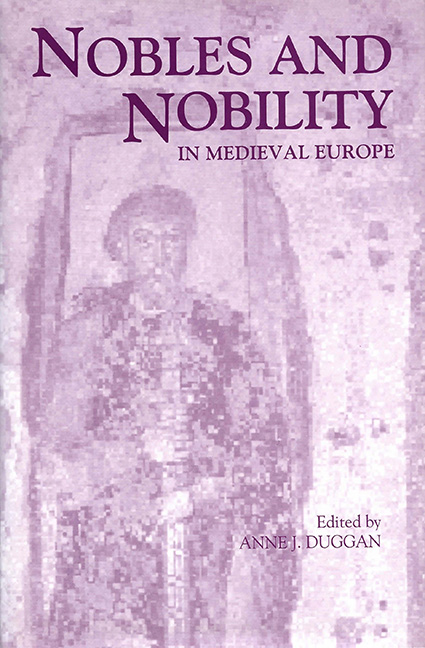 Nobles and Nobility in Medieval Europe
Nobles and Nobility in Medieval Europe from I - Early Middle Ages
Published online by Cambridge University Press: 25 October 2017
This contribution was conceived as an exploration of some of the ways in which the evident power of the medieval ceti dirigenti was created and maintained, as a good opportunity to do some hard thinking about what seemed and still seems to me to be one of the most important issues facing medievalists. The return on investment has turned out lower than expected, and I am now certain that better scholars have been here and returned, if not empty-handed, then at any rate not bearing the armfuls they had initially hoped for. Although the source and nature of political, social, and cultural power is a subject which historians in general and medievalists in particular have instinctively tended to shy away from, there is an extensive and highly sophisticated literature on the subject in the related disciplines of sociology and political science. I shall draw, tentatively, on some of this, without claiming anything like expert or comprehensive knowledge of the literature. The topic requires not an article but a large book; what is offered here is a series of possible entry points to the understanding of a complex of problems, and such answers as may appear are in the main highly provisional.
One reason for the difficulties lies, as it so often does, in the development of historiographical tradition. We are all familiar with the medievalists’ division of labour in this area, though we may not have articulated that familiarity to ourselves. Power relations amongst the upper classes, for which we have from most periods a good deal of evidence, have been the object of subtle analyses, using a range of methodologies. Together, these constitute a modern approach to medieval political history, which includes not only traditional political narrative and constitutional history but also what Johannes Fried has called neue Verfassungsgeschichte, ‘new institutional history’. With this, we know where we are and where we are going, even if the journey is not so certain as to become dull.
The history of the exercise of aristocratic power over virtually everybody else is quite different. We have more evidence of the results of that exercise than of the exercise itself.
To save this book to your Kindle, first ensure no-reply@cambridge.org is added to your Approved Personal Document E-mail List under your Personal Document Settings on the Manage Your Content and Devices page of your Amazon account. Then enter the ‘name’ part of your Kindle email address below. Find out more about saving to your Kindle.
Note you can select to save to either the @free.kindle.com or @kindle.com variations. ‘@free.kindle.com’ emails are free but can only be saved to your device when it is connected to wi-fi. ‘@kindle.com’ emails can be delivered even when you are not connected to wi-fi, but note that service fees apply.
Find out more about the Kindle Personal Document Service.
To save content items to your account, please confirm that you agree to abide by our usage policies. If this is the first time you use this feature, you will be asked to authorise Cambridge Core to connect with your account. Find out more about saving content to Dropbox.
To save content items to your account, please confirm that you agree to abide by our usage policies. If this is the first time you use this feature, you will be asked to authorise Cambridge Core to connect with your account. Find out more about saving content to Google Drive.